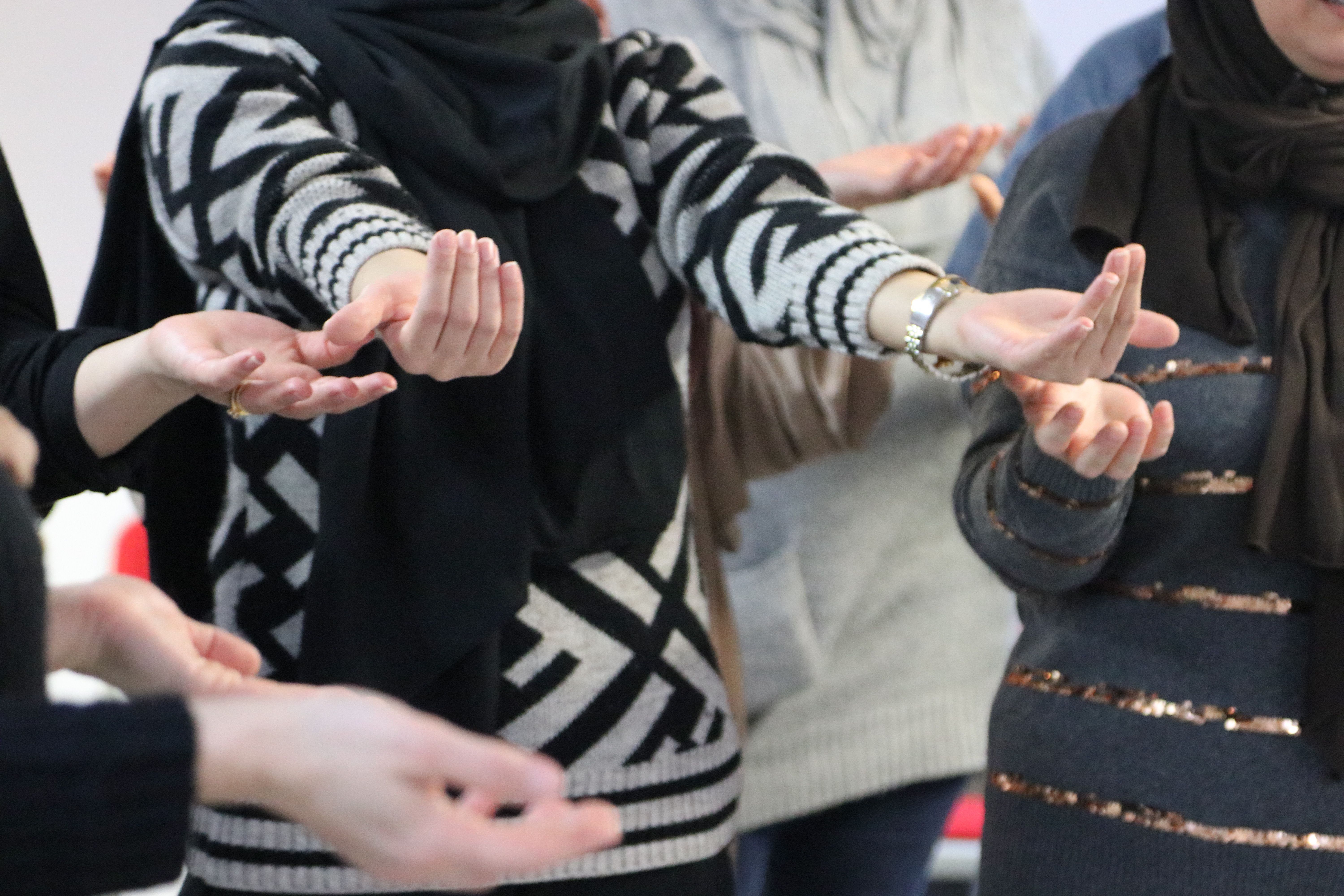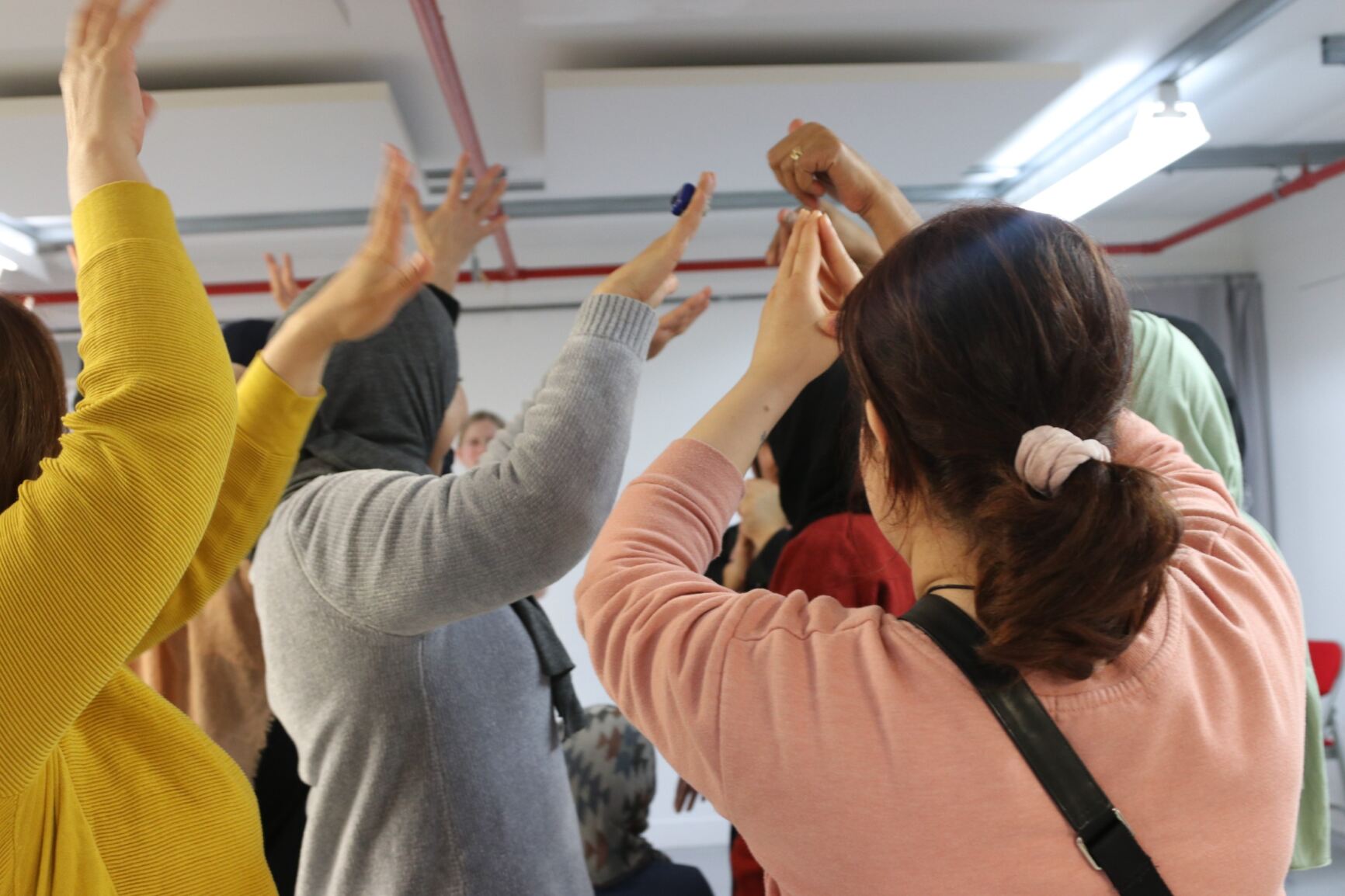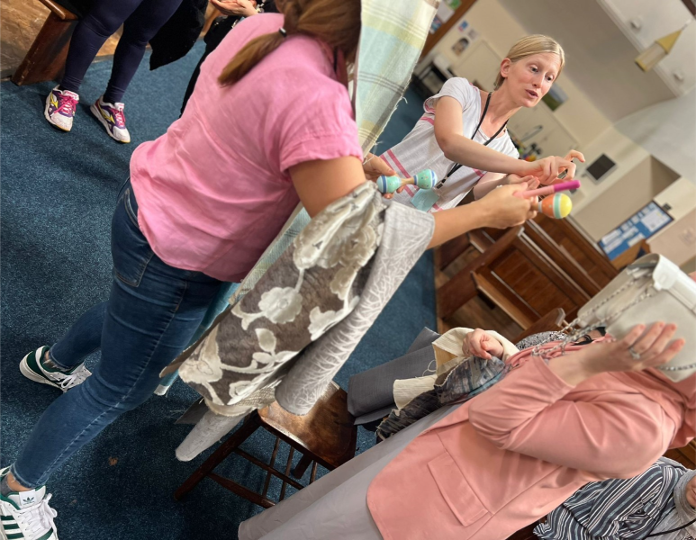Reflections from an innovative study, supported and funded by the NIHR ARC North Thames
Image: Participants of theatre research workshop hold hands
Involving people with experiences of trauma or marginalisation in research activities is worth considering carefully and creatively. For Professor Monica Lakhanpaul and Professor Nadia Svirydzenka, this is a matter to which they have dedicated their careers.
Both professors – the former based at UCL, the latter at De Montfort University – believe in creating spaces within research for the voices of those communities with much to share about overcoming inequalities, trauma, and complex histories of stigmatisation.
This has often led them to incorporate creative co-production methodologies that challenge the status quo and give rise to new learning and tailored solutions.
For their current research programme in particular, PSP-REFUGEE, co-production has been a priority.
The importance of co-production with marginalised communities
The PSP-REFUGEE project is exploring what tailored and culturally-sensitive support can be provided to refugee and asylum-seeking parents of young children living in temporary accommodation.
Such a goal means that the involvement of such parents themselves is essential.
Yet researchers and academics can represent an untrustworthy authority to refugee and asylum-seeking families due to the families’ past experiences of stigmatisation and being subjected to insensitive official processes.
Meanwhile, researchers have traditionally lacked the methodological flexibility required for meaningful inclusion of participant voices throughout the research process in a manner sensitive enough to accommodate their lived experiences, migration journeys, and trauma.
All-in-all, trauma histories, when ignored in the research process, can negatively impact the individuals involved, influence how and what information is shared, and thus the quality and reliability of the research findings.
Why creative approaches to research matter
To work as sensitively and positively as possible, trauma-informed creative methods have so far been a fundamental aspect of the PSP-REFUGEE project’s research.
Through theatre-based approaches, Professors Lakhanpaul and Svirydzenka and the wider research team have sought to develop trusting relationships and safe spaces within which to explore families’ needs and hopes for the future for themselves and their children.
On this project, they collaborated with Response Ability Theatre, a survivor-led theatre and participation arts charity that works to support and platform people living with post-traumatic stress to lead on how stories like theirs are told and learned from.
Theatre-based approaches are beneficial for communities experiencing high levels of trauma, varying levels of education, and limited knowledge of English. That’s because they offer an alternative, expressive and make-believe space within which participants are free to express themselves and share their lived experiences more safely through metaphor and abstraction.
Furthermore, theatre is a democratising process, dismantling perceived hierarchies of power between mothers and researchers and theatre practitioners.
In taking this approach, the project team are aiming for research to be an experience that enriches rather than depletes, and is generative rather than extractive.
As well as being a fruitful way to explore the types of culturally-informed support parents may benefit from, the workshops were an enriching experience for all of those involved.
Through the physicality of theatre exercises and storytelling, mothers were redefining their roles within the research as actors, owners of their own and community narratives. Below, they share their reflections:
Creative approaches to research: Perspectives from those involved
The participants' perspectives
Around 19 mothers took part in the workshops. For many, it was their first time taking part in research. Many brought their children with them, and were meeting each other for the first time. Some of their words have been relayed in translation by the co-facilitators. All of their perspectives are given anonymously.


Participant A
“It was a good experience for all women to act like one body. All collaborate with each other, and without speaking any words they got together and did the same actions, it was brilliant.”
Participant B
“When we come, we feel very happy, and we are doing something very important.”
Participant C
“In the beginning, I was shy, I thought maybe I can’t do this, but after, I’m not feeling shy, I’m relaxing, I’m happy. I’m feeling stressed inside my home, but I’m coming, I’m loving everything. I’m enjoying with my friend, with [the facilitator] Nell, very happy. She is very helping, for me, for enjoying.”
Participant D
“We were excited and had a really nice time. Because I saw new friends, made new friendships, and for me, in the home with my daughter and my husband, all the time I’m feeling nervous, but when I come to this, I’m really relaxing my mind, and with my daughter, my mind is changing, and everything is really changing for me. Because I saw so many Kurdish women, and women from my country.”
Participant E
"I would love to do this play in a big theatre."
Participant F
Translator speaking: “When she started she didn’t know everyone here, but now she feels like she knows them, and she would be very happy to do it again.”
The facilitator's perspective
The eight trauma-informed theatre sessions were led by professional theatre artist and founder of Response Ability Theatre (RAT), Nell Hardy, as well as a trauma counsellor. Response Ability Theatre is a survivor-led theatre and participation arts charity that works to support and platform people living with post-traumatic stress to lead on how stories like theirs are told and learned from. Nell says:


“I’d never done anything like it to be honest, and I didn’t really know what to expect. I was really excited about the prospect of a room in which people weren’t primarily going to be communicating through spoken language. That was quite frightening for me but also really exciting.
“I didn’t know what to expect from the women either... But these guys just went for it, and there’s been a real growth in confidence in coming forward with ideas over the course of this.
“We were working first from the body, and thinking about need.
“We looked at: what would make your life better right now? That might be things like a cup of coffee or a piece of chocolate.
“And then it was: what would make your lives better within a month’s time? Then it became something slightly different.
“And then it was: what would make your life better in a year’s time? So, it was using that sensory thing, to get to something that otherwise might be quite upsetting to talk about.
“From there, we could explore things from a space of joy.
“And it has just been a constant source of joy. I mean, there have been a couple of moments where healthy tears have come into the room, but it’s always felt restorative.
“My mood always rockets by the end of a session with [the participants]. Just the wealth of willingness and the wealth of zest for life that exists here is extraordinary and I’ll never forget it. Ever.”
The co-facilitators' perspectives
Each session was supported by four co-facilitators who themselves were refugee and asylum-seeking mothers with experience living in temporary accommodation who were involved in the co-design of the PSP-REFUGEE study. These co-facilitators were bilingual, fluent in either Arabic or Kurdish as well as English, to ensure effective communication with the participants, theatre facilitators, and researchers. Their responses are given anonymously.

Berivan Mu, Co-facilitator
“This was my first time being involved in research facilitation through theatre, and it was a truly unique experience. I found it rewarding to see how art and research could come together to create something so impactful and meaningful.
“I believe these workshops were important because they provided a safe and supportive space for moms to express themselves and share their experiences. The performance was a powerful way to communicate those stories to a wider audience, fostering empathy and understanding each other.
“The most enjoyable part for me was seeing how the mothers gradually opened up and found their voices through the creative process. It was inspiring to witness their confidence grow as they shared their stories and collaborated with the group.”
Xanda Aziz, Co-facilitator
“I was very happy to participate as a co-facilitator in this workshop. It was such a great opportunity for me, not only as a valuable experience for my future but also because I had the chance to work alongside amazing staff. I learned so much from them, and I am truly grateful for the opportunity.
“I believe that the workshop, which felt like a theatre experience, was incredibly important. It gave all of us a space to express our feelings and convey what was inside us through the acting process. This made the workshop truly impactful and meaningful.”
Anonymous Co-facilitator
“One of the most enjoyable aspects was seeing how participants engaged with the activities and how their perspectives evolved throughout the process. It was fascinating to observe the connections they made and the creativity that emerged.
“As it was my first time to be involved in a project like this one but this experience has been incredibly valuable for me, and it reinforced how powerful theatre and interactive workshops can be in facilitating meaningful discussions.”
“They provide a unique space for us to express ourselves, explore complex ideas, and connect with others in ways that traditional research methods might not allow. I really appreciated the opportunity to be part of it!”
A researcher's perspective
Dr Elizabeth Eveleigh, was a Mixed Methods Researcher in the NIHR ARC North Thames Research Partnership Team and one of the researchers on this programme. She organised and then observed the workshops to inform the findings of this part of the research. Below, she shares her personal reflections on what she witnessed.

“The workshop challenged the traditional norms of research participation, where the focus is often solely on data collection through formal methods.
“Instead, by integrating creative and interactive activities, we were able to engage participants more holistically and enjoyably, allowing them to express themselves beyond the constraints of conventional methods.
“I've really enjoyed getting to know the participants and co-facilitators in this study. The theatre workshops were a fantastic opportunity for us to build relationships and develop a sense of familiarity and trust right from the start.
“Several powerful themes presented in the workshops resonated with me and stayed with me long after. Despite the mothers coming from different countries and cultural backgrounds, their stories often shared striking similarities. This highlighted the universal power of storytelling to bridge gaps and foster understanding across diverse cultures.
“What stood out to me was that, even with the freedom to imagine anything in a fictional world, the mothers' wishes always came back to the human needs that we all deserve: safety, shelter, and living without fear.
“The workshops naturally acted as a bridge, allowing us to move from storytelling to a broader conversation about parenting through the lens of cultural traditions and language.
“This was my first introduction to using arts-based methods in research, and it has been an absolutely incredible experience.”
- Visit the PSP-REFUGEE project page on the NIHR ARC North Thames website and the CHAMPIONS project website
- Hear news from the PSP-REFUGEE project by subscribing to updates
- Sign up to the NIHR ARC North Thames newsletter to get the latest on this and other research projects
- Professor Lakhanpaul gave a presentation about this work on to a national ARC webinar about using creative approaches to research. Watch this seminar back.

 20 Jun 2025
20 Jun 2025
